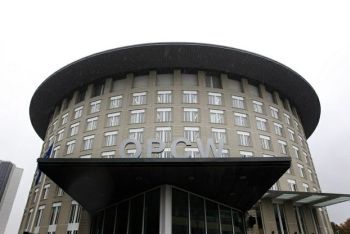
Publisher:
Bonnie King
CONTACT:
Newsroom@Salem-news.com
Advertising:
Adsales@Salem-news.com

~Truth~
~Justice~
~Peace~
TJP
Oct-13-2013 11:46

 TweetFollow @OregonNews
TweetFollow @OregonNews
Myanmar Urged to Ratify Chemical Weapons Treaty
Rachel Vandenbrink Radio Free AsiaThe signing came ten months after Thein Sein pledged to abide by the U.N.’s arms embargo on North Korea and to allow the IAEA full access to Myanmar weapons sites.
 A view of the headquarters of the Organisation for the Prohibition of Chemical Weapons in The Hague on Oct. 11, 2013. AFP |
(HONG KONG) - The Nobel Peace Prize awarded to a global chemical weapons watchdog on Friday has prompted a call for Myanmar to ratify a key international treaty banning the arms.
New York-based Human Rights Watch (HRW) said Myanmar must ratify the Chemical Weapons Convention two decades after signing if it wants to prove to the international community it is serious about reforms.
Despite political and economic reforms enacted since Myanmar’s military junta gave up power more than two years ago, experts say there are still looming questions about possible chemical weapons stockpiles and allegations that the military used chemical weapons against ethnic rebel groups.
Reformist President Thein Sein’s government has denied the claims.
Myanmar is one of a handful of countries that have not fully committed to the treaty, which prohibits the development, production, acquisition, stockpiling, retention, transfer, and use of chemical weapons.
The intergovernmental organization enforcing the treaty, the Organisation for the Prohibition of Chemical Weapons, was selected Friday as the winner of this year’s Nobel Peace Prize for its work to rid the world of the deadly agents and its current work helping Syria eliminate stockpiles of poison gas.
“The award of Nobel Prize to the Organization for the Prohibition of Chemical Weapons (OPCW) once again highlights how far Myanmar is from fulfilling international norms, despite the government’s rhetoric of reform,” HRW’s deputy Asia director Phil Robertson said.
“Chemical weapons pose a grievous rights threat to mankind, so why is Myanmar one of the hold-out nations in the world that has still not ratified the Chemical Weapons Convention?” he asked.
Robertson called on President Thein Sein to send the treaty to parliament and urged lawmakers to ratify it immediately in order to “bring Myanmar into line with international action against these abhorrent weapons.”
The call comes three days before the treaty formally enters into force for Syria, which has allowed OPCW inspectors to come into the country on a mission to investigate and destroy stockpiles of poison gas.
Signed but not ratified
Myanmar signed the convention in January 1993, a move that made it part of the first group of countries indicating a willingness to join.
But by not ratifying the treaty, it has not agreed to submit itself to international inspections and refrain from steps that would violate the convention.
Remaining non-signatories to the treaty are Angola, Egypt, North Korea, South Sudan, while Israel, like Myanmar, has signed but not ratified the convention.
In February, a technical assistance team from the OPCW visited the Myanmar capital Naypyidaw and met with lawmakers to discuss implementation of the treaty.
Myanmar’s government asserts the country has no chemical, biological, or nuclear weapons programs.
But ethnic armed rebel groups including the Kachin Independence Army (KIA) have accused the Myanmar military of using chemical weapons as recently as last year in their long running war in the country’s borderlands.
In the 1980s and early 1990s, the U.S. government voiced suspicions of a possible chemical weapons program under the military junta in Myanmar, naming China and North Korea as possible suppliers. Since then the U.S. has been less vocal in its concern about the issue.
According to global security nonprofit organization the Nuclear Threat Initiative, there is currently “no evidence” to suggest Myanmar has a chemical weapons program.
Allegations about a possible nuclear program are equally murky, with Myanmar facing suspicions of engaging in illegal trade with North Korea that possibly included covertly setting up an atomic program.
Last month Myanmar signed with U.N.’s nuclear watchdog, the International Atomic Energy Agency (IAEA), an additional protocol on nuclear disarmament that gives weapons inspectors wider access to facilities that could be used to develop nuclear technology.
The signing came ten months after Thein Sein pledged to abide by the U.N.’s arms embargo on North Korea and to allow the IAEA full access to Myanmar weapons sites.
 |
 |
 |
Articles for October 12, 2013 | Articles for October 13, 2013 | Articles for October 14, 2013
Salem-News.com:



Quick Links
DINING
Willamette UniversityGoudy Commons Cafe
Dine on the Queen
Willamette Queen Sternwheeler
MUST SEE SALEM
Oregon Capitol ToursCapitol History Gateway
Willamette River Ride
Willamette Queen Sternwheeler
Historic Home Tours:
Deepwood Museum
The Bush House
Gaiety Hollow Garden
AUCTIONS - APPRAISALS
Auction Masters & AppraisalsCONSTRUCTION SERVICES
Roofing and ContractingSheridan, Ore.
ONLINE SHOPPING
Special Occasion DressesAdvertise with Salem-News
Contact:AdSales@Salem-News.com

Terms of Service | Privacy Policy
All comments and messages are approved by people and self promotional links or unacceptable comments are denied.
kundi October 14, 2013 3:09 pm (Pacific time)
why not the israelis they have the weapons of mass destruction. get the to sign it first then u deserve the prize
[Return to Top]©2026 Salem-News.com. All opinions expressed in this article are those of the author and do not necessarily reflect those of Salem-News.com.